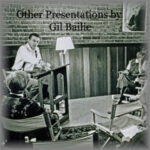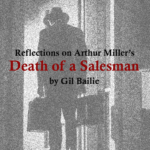Reflections on the Works of William Shakespeare
Reflections on Shakespeare’s Julius Caesar
Gil Bailie examines William Shakespeare’s Julius Caesar through the lens of René Girard. Shakespeare’s play looks at the volatile transition from republican Rome to Imperial Rome.
One of the chief protagonists of the drama is the ‘crowd’ or better the ‘mob’. This play was one of the primary sources from which Girard drew his mimetic theory.
Act 2 begins with Brutus’ self-seduction into the conspiracy to kill Caesar. “Therefore it is meet that noble minds keep ever with their likes, for who so firm that cannot be seduced?”
In Act 3 the conspirators assassinate Caesar and attempt to sacralize their deed – to turn the murder into a sacrifice. When sacred violence is compromised by the voice of its victim it no longer can constrain mimetic passions and all hell breaks loose… “let slip the dogs of war”.
The conflict swirling around Brutus and Cassius with the conspirators on the one hand and Antony and Octavius on the other depicts aspects of the mimetic crisis violence provokes. Shakespeare created a masterful display of mimetic doubling and conflictual undifferentiation in Acts 4 & 5 showing Brutus and Cassius side by side with Antony and Octavius.
Reflections on Shakespeare’s Troilus and Cressida
Troilus & Cressida reveals William Shakespeare in a dark mood. Written shortly after his play Julius Caesar, it reveals another episode of a culture under stress – this time by way of Homer’s epic story of the war between the Greeks and Trojans. Using the insights of René Girard’s mimetic theory, Gil Bailie brings the inner dynamics of Shakespeare’s play to life.
Reflections on Shakespeare’s Hamlet
The duty to avenge the murder of one’s father collides with the Christian commandment to love one’s enemies. Hamlet’s hesitation to perform his sacred duty provides the opening for Mr. Bailie to shine the illuminating rays of René Girard’s mimetic hypothesis on the role of violence in the origins of human culture and personhood by means of Shakespeare’s dramatic masterpiece.
Reflections on Shakespeare’s King Lear
Under the theme of ’Worthy Stories confused with Dubious Plots’ this exploration of one of the later plays of Shakespeare follows the crisis King Lear’s abdication precipitates and the cost to extricate himself from the ‘plot’ in order to enter the larger ‘Story’. Using the insights of René Girard’s mimetic theory, Gil Bailie brings the inner dynamics of Shakespeare’s play to life.
Reflections on Shakespeare’s The Tempest
The Bard of Avon’s last play, The Tempest, shares a bit of our contemporary fascination with the illusions of ‘reality TV’ and ‘stranded on a desert island’, orchestrated by the most gifted playwright the English language has produced in his farewell performance.



